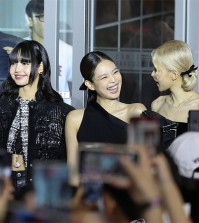- California Assembly OKs highest minimum wage in nation
- S. Korea unveils first graphic cigarette warnings
- US joins with South Korea, Japan in bid to deter North Korea
- LPGA golfer Chun In-gee finally back in action
- S. Korea won’t be top seed in final World Cup qualification round
- US men’s soccer misses 2nd straight Olympics
- US back on track in qualifying with 4-0 win over Guatemala
- High-intensity workout injuries spawn cottage industry
- CDC expands range of Zika mosquitoes into parts of Northeast
- Who knew? ‘The Walking Dead’ is helping families connect
‘Side effects of hallyu’ concern other Asian countries

With the Korean wave experiencing phenomenal popularity all across Asia, traditionalists in other countries are expressing similar concern over the harmful effects Korean TV shows and K-pop stars are having on their own societies. (NEWSis)
By Jung Min-ho
BANGKOK — When Japanese popular culture gained traction in Korea in the 1990s, critics deplored the comic books and music, saying they were destroying Korean traditions and values.
Now, with the Korean wave experiencing phenomenal popularity all across Asia, traditionalists in these countries are expressing similar concern over the harmful effects Korean TV shows and K-pop stars are having on their own societies.
Speaking to The Korea Times, journalists from a variety of Asian countries, from Mongolia to Thailand, said one of the most worrisome by-products of the Korean wave was the spread of plastic surgery.
“Many Mongolian women visit Korea these days to get plastic surgery,” said Cosmopolitan Mongolia editor-in-chief Khaliuna Bold. “This was extremely rare before Korean shows started running here 10 years ago.
“The cosmetic surgery business is thriving in Mongolia, too. Some girls go to hospitals to change their face to look like a certain Korean actress.”
Today, almost all Mongolian TV channels run Korean shows regularly, she noted.
“They have become guilty pleasures,” she said. “Despite rising concerns, people like them. So, broadcasting companies run them to make money.”
Over the past 10 years, the demand for plastic surgery in Thailand has also grown alongside the popularity of Korean TV shows and songs, said a reporter from The Nation, a Bangkok-based English daily newspaper.
In addition, the demand for such shows was expected to grow as Korean TV producers were promoting new ones.
In September, four episodes of the Korean makeover show, “Let Me in,” featured two Thai women getting free cosmetic surgery. This drew great attention in Korea and Thailand.
The Thai reporter, who declined to be named, said Korean cultural content had a bigger influence on people in Asia than did Hollywood, because Asians could relate more to Korean TV stars.
The Korean cultural wave, known as “hallyu,” has also profoundly changed the way Bhutanese live. This includes what they eat, what they wear and how they view the world, said Kinga Dema, a senior reporter of Kuensel, Bhutan’s national newspaper.
“Today, Koreanized culture is visible in clothes, hairstyles, shoes, bags and even language,” she said. “There are also many shops that sell Korean-inspired clothing. “The young people in Bhutan say there is nothing wrong with such clothing as they consider it fashionable, but many parents are concerned.
“Many young Bhutanese seem to be moving away from traditional values and culture. This is where the Korean influence comes in, which makes most elders worried.”
While the trend for plastic surgery is not quite as big among Malaysian young people, there has been a significant increase in interest in all things Korean, from food to fashion, hairstyles and other consumer products, according to S. Indramalar, a reporter for the Malaysia-based Star Online.
She said that even some Malaysian politicians had realized the popularity of K-pop and capitalized on it, bringing K-pop bands to the country to attract young voters.
The consensus among these journalists seems to be that Korea needs to be more responsible for what it makes and sells, given the country’s increasing influence in Asia and beyond.

















AFD
November 21, 2014 at 7:14 PM
Whether it’s Korean wave or Hollywood, it’s less about spreading cultural values than it is about spreading consumerism. The world is a cash cow.
Pingback: ‘Side Effects of Hallyu’ Concern Other Asian Countries - THE Aesthetic Report
Pingback: Hallyu's Homogenisation of Beauty in Asia - seoulbeats | seoulbeats